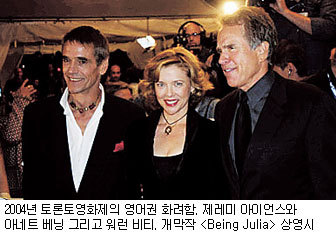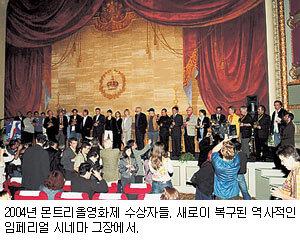음과 양은 잘 살아 있다. 캐나다의 영화제 세계에서 말이다. 여기엔 선언되지 않은 전쟁이 이런 행사의 미래에 대한 큰 암시를 갖고 절정에 다다르고 있을 것 같다.
나는 캐나다의 어느 호텔방에 앉아서 이 글을 쓴다. 북미 최대 규모의 가장 중요한 영화제인 토론토국제영화제(9월9∼18일)가 29회째 개최 중이다. 일주일 전쯤에도 캐나다에 있었는데, 그때는 28회째를 맞은 몬트리올세계영화제(8월26일~9월6일)에 있었다. 이 두 영화제와 두 도시는 불과 몇백 마일 떨어져 있지만, 서로 다른 나라나 심지어는 서로 다른 대륙에 있는 것이나 마찬가지다.
불어권 퀘벡주에 있는 몬트리올은 특색이 있으면서 꾀죄죄하고, 산이 많고 역사에 전 듯한 도시로 막강한 세인트 로렌스 강가에 자리해 있다. 말하자면 유럽 도시인데 공교롭게 북미에 위치해 있을 뿐이다.
영어권 온타리오주에 있는 토론토는 밋밋하고, 티 한점 없이 깨끗하고, 평탄하고, 역사성이 떨어지는 도시로 거대한 온타리오 호숫가에 있다. 이는 미국 도시인데 공교롭게 캐나다에 있는 것과 같다.
두 도시 모두 다중문화권이다. 몬트리올은 라틴계 인구 요소가 큰데 특히 스페인어를 하는 쪽이 많다. 토론토는 동아시아계 공동체가 형성돼 있는데 특히 중국인과 한국인이 많다. 그런데 두 도시가 공유하는 특징은 이뿐이다. 자기 정체성에 안심하고 있는 몬트리올은 마을 행세를 하는 도시와도 같은데, 정체성에 대해 혼란스러워 하는 토론토는 도시 행세를 하는 마을과 같다.
각 도시의 영화제 또한 그 고장의 사고방식을 그대로 반영한다. 창립자이자 오너인 크로아티아 태생의 세르지 로지크가 여전히 원맨쇼처럼 운영하는 몬트리올영화제는 국제경쟁 부문에 더해 커다란 세계 파노라마 부문을 갖췄다. 칸 마켓에 열흘 동안 있는 것과도 같은데, 언제 작은 보배를 우연히 발견하게 될지 모른다. 이 고장 관객은 영화를 잘 아는 사람들로 편견이 없고 감상 능력이 세련됐다.
토론토영화제는 떼를 지은 위원회들로 운영되며, 경쟁부문이 없고, ‘명성이 있는’ 영화와 감독들에 상당히 치중한다. 고장 관객은 사회적 겉치레에 더 관심을 가지고, 뭘 볼지 선택할 때는 남에게서 행동방침을 내려받길 좋아한다.
70년대 중반에 몬트리올은 화려함, 스타와 영화에 우세를 갖췄지만 당시 토론토는 아직 보수적인 벽지였다. 그런데 프랑스어를 쓰는 퀘벡이 캐나다로부터 탈퇴하겠다고 위협하자 미국 투자자본은 남쪽 영어를 쓰는 토론토영화제로 옮겨가기 시작했다. 80년대 토론토영화제는 점점 더 기꺼이 할리우드의 가을 개봉작 정켓을 치르는 장소가 되어줬다. 할리우드=스타=인지도=후원자란 공식은 90년대부터 영화제 세계를 지배한 것이다. 로지크는 이제 정부 지원 기관인 텔레필름 캐나다가 의뢰한 보고서에 면해 있다. 보고서는 불투명한 영화제 경영과 공식이사회의 부재나 재무 관련 비밀스러움을 비판하는 것이다. 텔레필름 캐나다는 지원금(현재 영화제의 20% 정도를 차지함)을 취소하겠다고 위협하고, 다른 이들이 도시에 새로운 가을 영화제 운영을 신청하기를 청했다.
로지크는 과거에도 몇번 정부의 위협과 맞서기도 했고, 캐나다는 일반적으로 비대결적인 스타일로 유명하기도 하다. 그렇지만 영화제 세계는 변하고 있다. 국제영화를 사랑하는 독립입장을 취한 개개인이 운영하는 행사들에서, 할리우드의 마케팅 플랫폼으로 이용당하기를 기꺼이 좋아하는 위원회와 후원자가 운영하는 기업형 행사로 변하는 것이다.
영화제들은 스타와 유명한 영화를 필요로 한다. 또한 화려함도 필요로 한다. 그렇지만 스타와 영화와 화려함은 오로지 미국에서만 만들어내는 것은 아니다. 국제영화제- 칸과 베니스를 포함한 영화제- 들이 그렇다는 잘못된 생각에 은밀히 결탁할 때 관객에게는 슬픈 날이 되는 것이다.
A Tale of Two Cities
By DEREK ELLEY
Yin and yang are alive and well and...living in Canada's film festival scene, where an undeclared war, with deep implications for the future of such events, may be reaching a climax.
I write this sitting in a hotel room in Canada, in the midst of North America's largest and most important festival, the Toronto Intl. Film Festival (9-18 Sept.), now in its 29th year. A week or so earlier, I was still in Canada, at the Montreal World Film Festival (26 Aug.-6 Sept.), which celebrated its 28th edition. The festivals, and cities, are only a few hundred miles apart - but they might just as well be in different countries, or even different continents.
Montreal, in the French-speaking province of Quebec, is a characterful, scruffy, hilly, history-soaked city on the banks of the mighty St. Lawrence River. It's a European city that happens to be in North America.
Toronto, in the English-speaking province of Ontario, is a bland, spotless, flat, history-light city on the edge of the huge Lake Ontario. It's a U.S. city that happens to be in Canada.
Both are multi-cultural. Montreal has a large Latin element, especially Spanish-speaking; Toronto has a sizable East Asian community, especially Chinese and Koreans. But that's the only characteristic they share. Montreal, secure in its own skin, is a city pretending to be a village; Toronto, conflicted about its identity, is a village pretending to be a city.
Each of the city's festivals exactly reflects the local mindsets. Still run like a one-man show by its founder-owner, Croatian-born Serge Losique, Montreal has an international competition plus a large world panorama. It's like being in Cannes' Market for 10 days: you never know when you'll stumble across a small gem. Local audiences are film-savvy, open-minded and sophisticated.
Toronto is managed by hordes of committees, has no official competition and is heavily into "name" films and directors. Local audiences are more into social posing and like to be led by the nose in choosing what to watch.
In the mid-'70s, Montreal had the edge on glamour, stars and films, while Toronto was still a conservative backwater. But as Francophone Quebec threatened to "separate" from the rest of Canada, U.S. investment capital started to move south to Anglophone Toronto, which was increasingly happy during the '80s to oblige Hollywood, as a place to junket its autumn releases. Hollywood = stars = profile = sponsors - an equation that has come to dominate the film festival world since the '90s.
Losique now faces a report, commissioned by government funding agency Telefilm Canada, that criticizes his untransparent management of the festival, its lack of an official board and secrecy with finances. Telefilm has threatened to withdraw its funding (around 20% of the festival's budget) and has asked others to tender for a new autumn film festival in the city.
Losique has faced off other government threats in the past, and Canada in general is famous for its non-confrontational style. But the film festival world is changing - from events run by individual mavericks with a love of international cinema to corporate-style events run by boards and sponsors happy to let Hollywood use them as marketing platforms.
Festivals need stars and name films. They also need glamour. But stars, movies and glamour are not exclusively U.S. inventions. It's a sad day for audiences when international film festivals - including Cannes and Venice -collude in the lie that they are.





